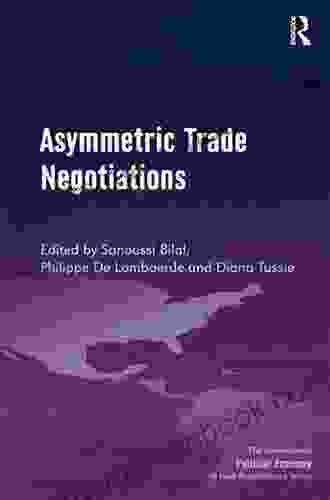Asymmetric Trade Negotiations: The International Political Economy of New

Asymmetric trade negotiations are a type of international trade negotiation in which one country has significantly more power than the other. This can be due to a number of factors, such as the size of the two economies, the level of development, or the political clout of the two countries.
Asymmetric trade negotiations can have a number of negative consequences for the weaker country, including the loss of jobs, the decline of industries, and the erosion of sovereignty. In this article, we will examine the international political economy of asymmetric trade negotiations and discuss some of the ways in which they can be more equitable.
4.4 out of 5
| Language | : | English |
| File size | : | 3440 KB |
| Text-to-Speech | : | Enabled |
| Screen Reader | : | Supported |
| Enhanced typesetting | : | Enabled |
| Word Wise | : | Enabled |
| Print length | : | 222 pages |
The Causes of Asymmetric Trade Negotiations
There are a number of factors that can contribute to the asymmetry of trade negotiations. Some of the most common include:
- The size of the two economies. Larger economies have more bargaining power than smaller economies. This is because they can threaten to impose tariffs or other trade barriers on the smaller economy, which can have a devastating impact on the smaller economy's exports.
- The level of development. Developed countries have more advanced economies than developing countries. This gives them a number of advantages in trade negotiations, such as the ability to produce goods and services more efficiently and to access more advanced technology.
- The political clout of the two countries. Countries with more political clout have more influence in international organizations, such as the World Trade Organization (WTO). This gives them a greater ability to shape the rules of international trade in their favor.
The Consequences of Asymmetric Trade Negotiations
Asymmetric trade negotiations can have a number of negative consequences for the weaker country, including:
- The loss of jobs. Asymmetric trade negotiations can lead to the loss of jobs in the weaker country, as businesses relocate to the stronger country to take advantage of lower labor costs or other advantages.
- The decline of industries. Asymmetric trade negotiations can lead to the decline of industries in the weaker country, as businesses are unable to compete with the more efficient producers in the stronger country.
- The erosion of sovereignty. Asymmetric trade negotiations can lead to the erosion of sovereignty in the weaker country, as the stronger country is able to impose its will on the weaker country.
Making Trade Negotiations More Equitable
There are a number of ways to make trade negotiations more equitable. Some of the most important include:
- Creating a level playing field. Governments can create a level playing field for trade negotiations by ensuring that all countries have access to the same information, technology, and resources.
- Providing technical assistance. Governments can provide technical assistance to developing countries to help them build their capacity to participate in trade negotiations.
- Establishing fair trade rules. Governments can establish fair trade rules that protect the interests of all countries, regardless of their size or level of development.
Asymmetric trade negotiations are a major challenge to the global trading system. They can have a number of negative consequences for the weaker country, including the loss of jobs, the decline of industries, and the erosion of sovereignty. However, there are a number of ways to make trade negotiations more equitable, such as creating a level playing field, providing technical assistance, and establishing fair trade rules. By working together, we can create a more just and equitable global trading system.
4.4 out of 5
| Language | : | English |
| File size | : | 3440 KB |
| Text-to-Speech | : | Enabled |
| Screen Reader | : | Supported |
| Enhanced typesetting | : | Enabled |
| Word Wise | : | Enabled |
| Print length | : | 222 pages |
Do you want to contribute by writing guest posts on this blog?
Please contact us and send us a resume of previous articles that you have written.
 Top Book
Top Book Novel
Novel Fiction
Fiction Nonfiction
Nonfiction Literature
Literature Paperback
Paperback Hardcover
Hardcover E-book
E-book Audiobook
Audiobook Bestseller
Bestseller Classic
Classic Mystery
Mystery Thriller
Thriller Romance
Romance Fantasy
Fantasy Science Fiction
Science Fiction Biography
Biography Memoir
Memoir Autobiography
Autobiography Poetry
Poetry Drama
Drama Historical Fiction
Historical Fiction Self-help
Self-help Young Adult
Young Adult Childrens Books
Childrens Books Graphic Novel
Graphic Novel Anthology
Anthology Series
Series Encyclopedia
Encyclopedia Reference
Reference Guidebook
Guidebook Textbook
Textbook Workbook
Workbook Journal
Journal Diary
Diary Manuscript
Manuscript Folio
Folio Pulp Fiction
Pulp Fiction Short Stories
Short Stories Fairy Tales
Fairy Tales Fables
Fables Mythology
Mythology Philosophy
Philosophy Religion
Religion Spirituality
Spirituality Essays
Essays Critique
Critique Commentary
Commentary Glossary
Glossary Bibliography
Bibliography Index
Index Table of Contents
Table of Contents Preface
Preface Introduction
Introduction Foreword
Foreword Afterword
Afterword Appendices
Appendices Annotations
Annotations Footnotes
Footnotes Epilogue
Epilogue Prologue
Prologue Emmet Cruz
Emmet Cruz Kathy Collins
Kathy Collins Bones Monroe
Bones Monroe Jami Fowler White
Jami Fowler White Tom Friend
Tom Friend Lena Nemchenko
Lena Nemchenko Amy Mackelden
Amy Mackelden Amy Lowell
Amy Lowell Martin Wolf
Martin Wolf Charles Fillmore
Charles Fillmore W Winters
W Winters Vintage Visage
Vintage Visage Stephen Walker
Stephen Walker Gemma Liviero
Gemma Liviero M C Roberts
M C Roberts Colin Sinclair
Colin Sinclair Sean Fletcher
Sean Fletcher Paul Remack
Paul Remack Elton T E Barker
Elton T E Barker Bobby Hundreds
Bobby Hundreds
Light bulbAdvertise smarter! Our strategic ad space ensures maximum exposure. Reserve your spot today!

 Jimmy Butler1st Case James Patterson: A Gripping Legal Thriller That Will Keep You on the...
Jimmy Butler1st Case James Patterson: A Gripping Legal Thriller That Will Keep You on the...
 Fyodor DostoevskyThe PBIS Tier Two Handbook: A Comprehensive Guide for Implementing Tier Two...
Fyodor DostoevskyThe PBIS Tier Two Handbook: A Comprehensive Guide for Implementing Tier Two... Forrest BlairFollow ·6.7k
Forrest BlairFollow ·6.7k Percy Bysshe ShelleyFollow ·18.6k
Percy Bysshe ShelleyFollow ·18.6k Samuel Taylor ColeridgeFollow ·7.7k
Samuel Taylor ColeridgeFollow ·7.7k Sammy PowellFollow ·13.2k
Sammy PowellFollow ·13.2k Raymond ParkerFollow ·13.4k
Raymond ParkerFollow ·13.4k Dominic SimmonsFollow ·16.4k
Dominic SimmonsFollow ·16.4k Alex FosterFollow ·12.7k
Alex FosterFollow ·12.7k Henry Wadsworth LongfellowFollow ·3.7k
Henry Wadsworth LongfellowFollow ·3.7k

 Jesus Mitchell
Jesus MitchellThe Diabetics Menu: Your Low Carb Options
If you're living with diabetes, you may be...

 Danny Simmons
Danny SimmonsThe Sam Reilly Collection: A Treasure Trove of...
In the realm of...

 Vic Parker
Vic ParkerThe Shepherdess of Siena: The Extraordinary Life of Saint...
Catherine of Siena, known as the...

 Christian Carter
Christian CarterDive into the Mystical World of Meraki Syren: A Literary...
A Literary Odyssey Through the Depths...

 Eric Hayes
Eric HayesSimplest Method on How to Remove Credit Cards from Your...
Do you have multiple credit cards...
4.4 out of 5
| Language | : | English |
| File size | : | 3440 KB |
| Text-to-Speech | : | Enabled |
| Screen Reader | : | Supported |
| Enhanced typesetting | : | Enabled |
| Word Wise | : | Enabled |
| Print length | : | 222 pages |










